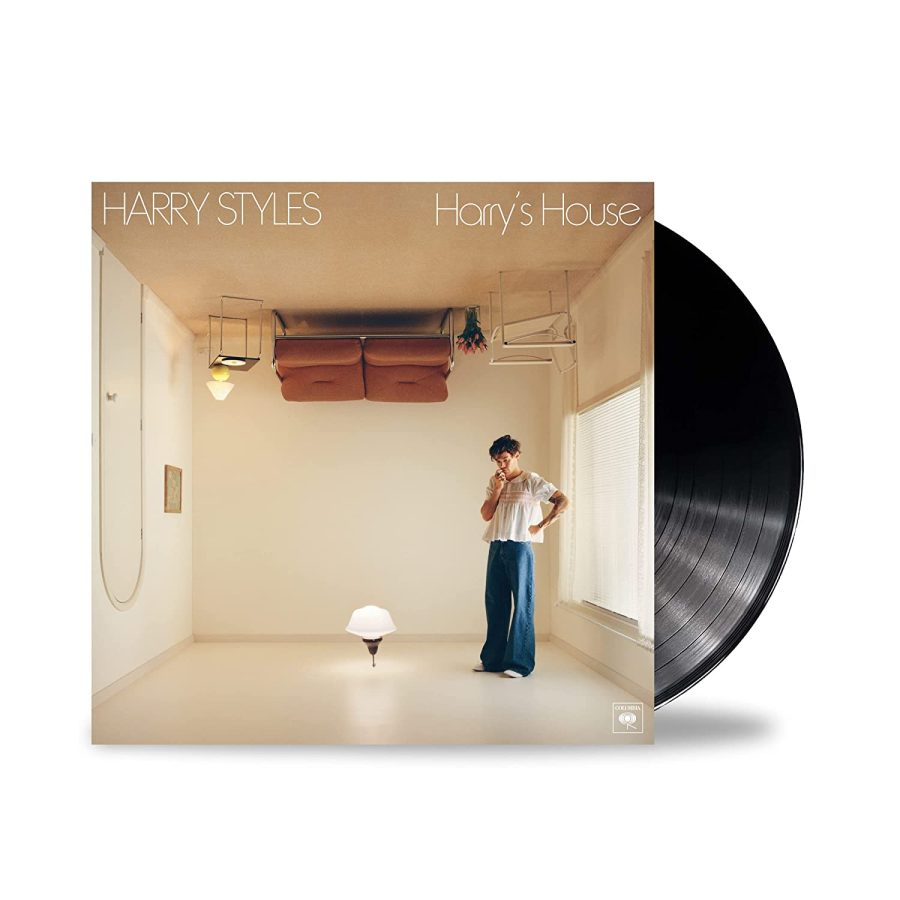Harry’s House: a review
June 17, 2022
Ever since One Direction announced their indefinite hiatus in 2015, Harry Styles has seen great success in his solo career, dropping chart topping singles in “Sign of the Times” and “Watermelon Sugar,” earning over $62 million in his first solo tour, and releasing record breaking albums such as Fine Line, which became the largest sales debut from an English artist in the US to date. Beyond music, Styles has become a fashion icon and an up-and-coming actor, becoming the first male to grace the cover of “Vogue” magazine and receiving praise from critics for his debut role in the period piece “Dunkirk.” His 3rd solo album, “Harry’s House,” delves into the true meaning of a home, and is another installment in his already legendary career.
Music For a Sushi Restaurant
The album kicks off with a smooth jazzy cut, characterized by a buoyant base line that builds into a grand ensemble of trumpets at the chorus. The lyrics draw parallels between a bubbly romance and food, with phrases such as, “You’re sweet ice cream/but you could use a Flake or two” and “If the stars were edible / And our hearts were never full / Could we live with just a taste?”
Late Night Talking
Harry laments over a recent breakup, unable to move forward: “Can’t get you off my mind / I won’t even try.” His slightly desperate, pleading singing is accompanied with a series of short, jittery synths. As the song progresses, the production becomes muddier, with the addition of longer oscillating synths, keyboard jabs, and multiple vocal phrases interpolated on top of one another.
Grapejuice
Harry continues to remind himself of his former love interest, wishing for reconciliation: “A bottle of rouge / Just me and you”. The track is warm and leisurely, with legato piano notes echoing over a consistent drum pulse. A grungy bass line found towards the beginning and end of the song provides a nice contrast to the otherwise clean instrumentals.
As It Was
The first single released off the album spotlights a dynamic drum beat, with brisk hi-hats over a boomy kick snare pattern. A dotted synth melody occasionally drops in, as Harry sings drained, disheartened lines, continuing the theme of lost love: “When everything gets in the way / Seems you cannot be replaced” and “Ringin’ the bell / And nobody’s coming to help.”
Daylight
Daylight features the most affectionate songwriting on the album, with sappy lyrics like, “If I was a bluebird, I would fly to you / You’d be the spoon / Dip you in honey so I could be sticking to you.” The musical interludes filled with resounding guitar strumming and brash drum strikes resemble a rock and roll passage, and provide an entertaining change of pace to the summery, downbeat singing in the verses.
Little Freak
In this slow and sweet serenade, Harry reminisces of the memories he shared in a past relationship: “Somehow, you’ve become some paranoia” and “Red wine and a ginger ale” / But you would make fun of me, for sure.” The tenderly sung verses gradually build into the heart-wrenching chorus (“I was thinking about who you are / Your delicate point of view”), where textured, ethereal vocals bring the listener to a warm, dreamlike state.
Matilda
Matilda is a tranquil cut, with Harry gently crooning to a girl whose family abused her. The title of the track references the book Matilda by Ronald Dahl, where a girl with telekinetic powers is discriminated against by the people around her. The production on this track is the most bare on the album, with a cozy acoustic guitar solo in the first half, and a tender piano chord progression in the second half. The use of a single instrument accompaniment allows Harry’s velvety vocals to shine through, with lyrics such as, “You don’t have to be sorry for doing it on your own / You can let it go” and “In other words, I know they won’t hurt you anymore / As long as you can let them go.”
Cinema
Harry opens the track with the infectious “You got, you got the cinema”, attracting the listener into this lowkey, dance pop tune. Harry details his infatuation with his partner’s every move, with sensual lines like,”Don’t know why, but it feels so right to me / Something in the way you move” and “I guess you’re all mine.” The song’s chill, lax vibe is highlighted by muted, silky keystrokes and mellow bass riffs that constantly vary throughout the four minute runtime.
Daydreaming
In this 80s-esque disco groove, Harry relishes in the joy of a newfound love: “‘Cause, baby, lovin’ you’s the real thing / It just feels right”. Harry’s vocals, whether it be the energetic scatting of “aiyyaa-ah-ah-ah” in the background, or the bright, airy warbling in the foreground, gives the track a celebratory feel. The funk aesthetic of the track is emphasized by the vibrant bass line, bellowing trumpets, and fluid, cascading drums.
Keep Driving
“Keep Driving” feels like the perfect lazy road trip song, which is ironic as Harry uses driving as a metaphor to push through the low points in a romance: “We held darkness in withheld clouds / I would ask, “Should we just keep driving?” The simple one-two kick-snare arrangement and cyclic synth pattern reinforces the easy vibe of the cut.
Satellite
Satellite has a sci-fi influence, with high-pitched, spacy synths sprinkled in the distance. Over the futuristic production, Harry stresses over the lack of communication in a relationship, frustrated that his partner refuses to reach out to him: “Am I bothering you? Do you wanna talk? / We share the last line“ and “I can see you’re lonely down there / Don’t you know that I am right here?” Towards the end of the track, the overall sound is substantially amplified, with the synths concealed under reverberating drums and echoing bass.
Boyfriends
Harry portrays the emotional harm caused by boyfriends in this soothing, folk lullaby: “Only callin’ you when / He don’t wanna be alone” and “They don’t tеll you where it’s heading / And you know thе game’s never ending.” His delicate voice over the duetting guitar lines, both sentimental and unpolished, evokes feelings of longing and nostalgia in the listener.
Love of My Life
The record finishes on a bittersweet note, with Harry describing his love for his house in England, personifying the home with a lover: ”Baby, you were the love of my life, woah / Maybe you don’t know what’s lost till you find it” and “I don’t know you half as well as all my friends / I won’t pretend that I’ve been doin’ everything I can.” The lone hi-hats, low, rumbly synths, and defeated vocals underscore Harry’s melancholy emotions, which is only exaggerated by the desolate piano melody at the end. Despite the downhearted instrumentation, the last key hit ends on a positive note, conveying a tinge of hope as the album concludes.
Although the production and lyrical themes can be generic at times, the strong vocal performances and distinct musical variation between tracks make this album an enjoyable listen. 🔳




